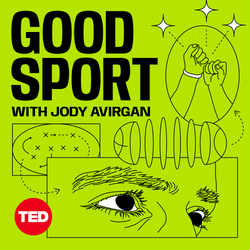Share

Body Stuff with Dr. Jen Gunter
Should I do a juice cleanse? Do I really need 8 glasses of water a day? Is it actually possible to "boost" my immune system? You’re constantly bombarded with news stories, ads, and social media posts telling you how to optimize your health—but a lot of these sources that pretend to be backed by science have another agenda. Dr. Jen Gunter is here to bust the lies you’re told—and sold—about your health, debunking some of the stickiest myths out there while helping you to understand how your body really works.
Latest episode

A special new podcast from Dr. Shoshana Ungerleider
28:01|TED Health's very own Dr. Shoshana Ungerleider has a new podcast, Before We Go. This is the first episode -- if you'd like more from Before We Go, check it out wherever you are listening to this.Dr. Shoshana Ungerleider's world shifts when her father calls to say that he has been diagnosed with stage 4 pancreatic cancer. As they navigate uncharted emotional terrain, Shoshana and her father explore options, including one they hadn’t before considered – medical aid in dying. But before they can decide, doctors tell Steven that something about his past might offer him hope.
More episodes
View all episodes

Fixable: Kelli - "How do I deal with a communication breakdown?"
27:42|This is an episode of Fixable, a new business call-in podcast from the TED Audio Collective hosted by Harvard Business professor Frances Frei and CEO and best-selling author Anne Morriss. Kelli is a nurse at a leading teaching hospital where communication issues are not only leading to resentment – they could also be affecting patient care. After hearing from Kelli about the larger problems at play in the healthcare space, Anne and Frances discuss the link between communication and transparency and guide Kelli into taking matters into her own hands. If you want to be on Fixable, call the hotline at 234-Fixable (that's 234-349-2253) to leave Anne and Frances a voicemail with your workplace problem -- or email them at fixable@ted.com
The Truth About "The Zone"
33:30|This week on Body Stuff we’re excited to introduce TED’s newest podcast, Good Sport, hosted by veteran sports producer Jody Avirgan. What can sports teach us about life – and each other? Good Sport brings you invigorating stories from on and off the field to argue that sports are as powerful and compelling a lens as any to understand the world – from what happens when you age out of a sport, to how we do or don't nurture talent, to analyzing how sports arguments have become the mode for all arguments. Good Sport launched on February 8th and you can find it anywhere you’re listening to this. TED Audio Collective+ subscribers on Apple Podcasts can hear the whole season early and ad-free. When it comes to sports, is there anything more evocative –and elusive– than “the zone”? That mythical place an athlete goes to where focus is laser-sharp, nothing can go wrong, and time just vanishes. In this episode, Jody talks to NBA All-Star great Steph Curry about what “the zone” means for him – and whether or not it even exists. Then Jody works on his mental game with sports psychologist Dr. Nicole Detling, and follows Olympic biathlete Clare Egan in a step-by-step guide on how to foster mental resilience after failure. Transcripts for Good Sport are available at go.ted.com/GStranscripts
Can a chiropractor really fix my back?
28:19|Back pain is extremely common. (The U.S spent around $135 BILLION on it in 2016 alone!). It’s also complicated, because sometimes it’s one thing, but often it’s a combination of factors with no single “root cause” or fast fix, and many doctors unfortunately don’t do a good job of evaluating back pain, or even explaining it. So when medical practitioners advertise quick fixes and fast relief, it's easy to fall prey to procedures that might do you more harm than good to you and your wallet— like “cracking” your back, or unnecessary surgery. In today’s episode, Dr. Jen helps you understand where back pain comes from, how science solidly debunks the legitimacy of chiropractors, and shares real solutions you can use to treat your pain so that you can get BACK to enjoying all the amazing things your body can do when it receives science-backed treatment. For the full text transcript visit: https://go.ted.com/BSTscript16
What we need to understand about opioids | Body Stuff
30:58|When we are in pain, we often turn to over-the-counter medications like acetaminophen. Sometimes, however, we’re prescribed opioid painkillers, and there’s a perception that this will be a more effective treatment, because opiods are the “strongest” treatment. But a lot of what we think we know about opioids is due to propaganda from pharmaceutical companies and confusing medical guidelines. In today’s episode, Dr. Jen breaks down opioids: what ARE they? What do they do in our brain, and how do they affect pain? From discussing the difference between opioid addiction and opioid dependence, to tracing the history that’s led to today’s epidemic of opioid addiction (and what we might try as a society to fix it), this episode aims to arm you with information – because we all deserve access to responsible pain treatment. https://go.ted.com/BSTscript15
Why are people worried about vaccines and fertility?
29:02|It’s no shock that how we communicate about vaccines matters. A LOT. For example, one of the reasons some people don’t want to get vaccinated against COVID19 is because of anti-vaccine propaganda that falsely links the vaccine with infertility. Unfortunately, these kinds of myths are part of the playbook that’s been employed by anti-vaccine propagandists for… well, pretty much as long as there have been vaccines. And while this kind of targeted misinformation was predictable, powers in charge failed to take that threat seriously, and misinformation has become rampant across our communities. In this episode, Dr. Jen reviews how vaccines are developed and how they are tested for safety, including reproductive safety—and suggests strategies to address vaccine misinformation if you encounter it in the wild. For the full text transcript visit: https://go.ted.com/BSTscript14
Do I really have a food allergy?
29:51|These days it can feel like anyone can be allergic to anything– with sensitivities ranging from common allergies to certain foods and animals to more unusual things, like semen or the chemicals used to treat leather. But is that true–ARE we becoming more allergic to things? What IS an allergy anyway and what are things that simply mimic an allergic reaction? Can you have a temporary allergy, and do we ever develop them later in life? In this episode, Dr. Jen explores theories of how allergies evolved and shares how to get tested – legitimately – to see if you really have one. For the full text transcript visit: https://go.ted.com/BSTscript13